News & Media
Unisa symposium highlights the need to rethink education for the AI era
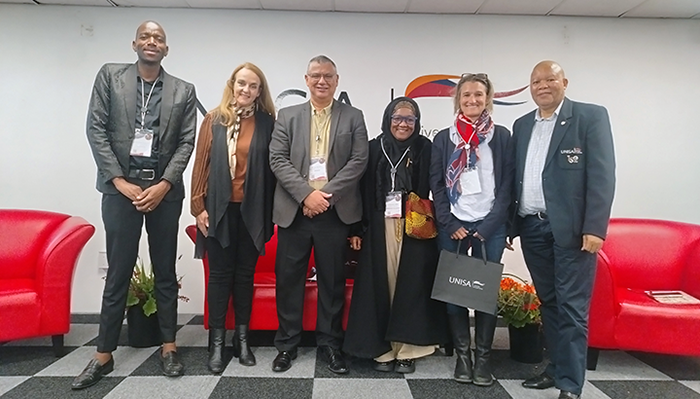
Speakers, from left: Motlokwe Thobejane (Unisa), Liana Joubert (Unisa), Juan Benjamin (WCED), Dr Shahieda Jansen (Unisa), Prof Daniela Gachago (UCT) and Motale Nkgoang (Unisa)
On 18 and 19 September 2025, Unisa’s Western Cape region hosted its 11th Annual Academic Development Symposium in partnership with the Academic Development Open Virtual Hub (ADOVH).
Themed "Rethinking Teaching, Learning and Student Support: Exploring Opportunities for Innovation and Shaping Future-Ready Graduates in the Age of Artificial Intelligence (AI) and the Fifth Industrial Revolution (5IR)", the event served as a powerful reminder of the universal challenges and opportunities facing institutions of both basic and higher learning. The symposium also paved the way for important and critical conversations about the future impact of digitalisation on higher education and how global trends are gradually unfolding.
The symposium brought together a diverse range of higher and basic education practitioners, academics, educational technologists, administrators and support staff from various higher education institutions, technical and vocational education and training (TVET) colleges, and government departments.
The collective mission of symposium delegates was to address innovation and sustainability across six distinct symposium streams, ranging from innovative teaching and learning practices in the AI and 5IR contexts to collaborative solutions for skills shortages and institutional adaptability.
Throughout the academic and professional discourses, the central question remained: How can academic and support practitioners balance the transformative potential of artificial intelligence and the demands of 5IR with the enduring need for human connection, equity, and academic integrity within the African educational ecosystems, all while maintaining a transformative agenda that responds to the diverse needs of institutional and organisational stakeholders?
A call for courage, adaptability and variability
As cited in the symposium’s preamble, educational developments continue to create exciting opportunities for innovation. However, amid these opportunities for content creation, communication, innovation and learning, new challenges also arise regarding academic integrity, access to information, and the relevance of mainstream qualifications in a world of constant change.
In this context, concerns about the misuse and overreach of digitalisation have become a key focus, as discussions with speakers and panellists oscillated between seemingly polar ideas: the replacement of human activity by technological capabilities and the need to reinforce elements to counteract overreliance on technology, particularly in contexts where the complexity and variability of learning modalities are still developing.
The event’s tone was decisively set by Unisa’s leadership. In her welcome address, Liana Joubert, Deputy Registrar at Unisa, urged a proactive approach to AI and 5IR. She indicated that equity in change, opportunities and context should not be punitive in the innovative learning domains, but rather transformative, allowing students to learn and use AI in ways that can place them a step ahead in practice. "Here," Joubert continued, "student learning, innovation, guided ethics and transformative frameworks can support such change."
In his opening address, Prof Moloko Sepota, Unisa Registrar, issued a challenge that resonates far beyond South Africa. Sepota emphasised the need for higher education institutions to continually assess and adapt to trends, technologies and practices within their specific context. Sepota's address particularly highlighted key aspects of technology, asserting that innovation in teaching and learning should not merely be a fait accompli in modern discourse. Instead, it is important to consider different perspectives while keeping specific institutional and functional contexts in mind. He stated, "We will have failed in our duty if we do not support the emergence of graduates who do not fear artificial intelligence but who embrace it".
Insights from keynote addresses: Unpacking equity, inclusion and cross-sector collaboration
The keynote addresses deepened the conversation by highlighting these critical and interconnected priorities for academics, and professional support staff. In his keynote address, Dr AC Tshivhase of Unisa explored the broad transformations driven by AI and 5IR. At the same time, Juan Benjamin from the Western Cape Education Department (WCED) advocated for stronger collaboration between basic and higher education to build a pipeline of digitally literate students, which remains a key concern for any institution focused on preparatory pipelines.
Prof Daniela Gachago (University of Cape Town) brought a crucial focus on inclusive education, emphasising learning design, and examining how technology can be harnessed to foster cultures of care in spaces where learners can rediscover the joy and humanity of learning through technology.
This theme resonated in parallel sessions that addressed pressing issues, such as the digital divide in online learning and supporting the mental well-being of students and staff in a rapidly changing academic environment.
The closing remarks of Motale Nkgoang, Regional Director of the Western Cape, on the first day of the symposium emphasised the critical lens of equity, inclusion and cross-institutional collaboration, advocating for continued advancements in teaching and learning. He emphasised that higher education leaders must continually challenge the processes and infrastructure that hinder instructional innovation.
Although the practical implications might reveal how digital access costs, instructional modalities and network infrastructure impact equitable participation, especially for students facing technological marginalisation, Nkgoang praised the efforts and called for thoughtful and meaningful adaptation to digitalisation.
From theory to practice: Workshops and cross-institutional dialogue
The second day of the symposium focused on practical applications and collaborative problem-solving, featuring a plenary session on meaningful and flexible digital ecologies, followed by crucial conversations and workshops.
Michelle Frauendorf, Deputy Director of Unisa Western Cape, reminded delegates of the implications for higher education institutions that operate in a volatile, uncertain, complex and ambiguous (VUCA) environment, which makes skills such as critical thinking and innovation more essential than ever.
In her opening address, Dr Makgato-Khunou, Director of the Department of Instructional Support and Services, emphasised the importance of considering students’ contexts within the South African higher education landscape and ensuring that support remains inclusive, intentional and adaptive to their lived realities. She further stressed the need to "teach our students to use AI ethically and wisely, as a guide, not a replacement, and to train our staff to use it confidently".
Prof Jacqueline Batchelor, Vice Dean: Teaching and Learning at the University of Johannesburg, reinforced the need to guide students to make "healthy cognitive choices, to think critically, act ethically and use technology to deepen, not diminish, their humanity". She emphasised that learning is relational, occurring through emotion, human connection and meaning-making rather than mere information retrieval.
A significant strength of the event was its deliberate cross-pollination of ideas and solutions through panel networks. Panel discussions featured representatives from a diverse range of institutions, including the University of Johannesburg (UJ), the University of the Western Cape (UWC), Rhodes University (RU) and the TVET sector, among others. This highlighted a shared recognition that no single institution can navigate these AI and 5IR shifts alone and that a need exists to exchange best practices and collaborative solutions. A key takeaway was that AI should enhance, not replace, the human dimensions of teaching, learning and student support, reaffirming the need for shared policies and practices that bridge digital divides and promote equitable access.
The symposium concluded with hands-on workshops, including a masterclass on using Elicit AI for research led by Dr Denzil Chetty (Project Lead: ADOVH), and a session by Dr Shahieda Jansen (Deputy Director: Western Cape) on "Curricularising Relational Humanness in AI-driven Teaching". These sessions underscored the event’s core conclusion: that the goal is not to replace humanity with technology, but to thoughtfully integrate the tools, ideas and flexibility in capitalising on technological trends and innovative learning modalities to enhance both learning and human connection.
Conclusion: A universal imperative
The 11th Academic Development Symposium in Cape Town confirmed that conversations are essential for embracing the benefits of multimodality, including content creation and learning design.
The discussions highlighted the global need for awareness and support of AI and 5IR in education, transcending even national boundaries and institutional specifics. The questions raised about equity, assessment, support and the very purpose of a degree are being asked with equal urgency across institutions of higher learning in South Africa.
As Sepota concluded, "It is not primarily about us as universities or academics, but about the students, the future, and our country".
The work being done at Unisa and partner institutions serves as an inspiring example of the global academic community coming together to shape a future where technology serves humanity and equips graduates not only to navigate change but also to lead it. Their efforts remind us that our own work at Unisa is part of a larger, essential project to redefine excellence in higher education for a new Age.
Over five hundred participants from various universities and TVET colleges attended this year’s Academic Development Symposium.
* Compiled by Communication and Marketing, Unisa Western Cape
Publish date: 2025-11-13 00:00:00.0


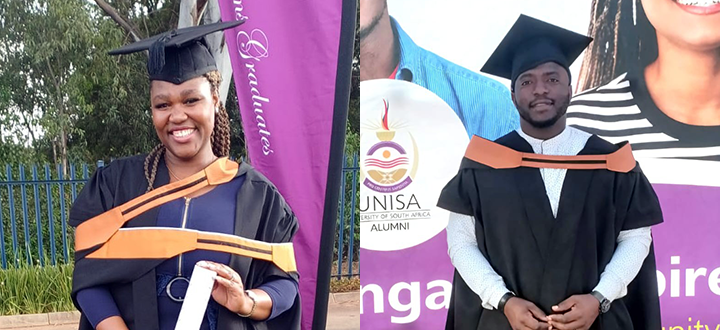 Matrimonial magnificence as husband and wife graduate at Unisa
Matrimonial magnificence as husband and wife graduate at Unisa
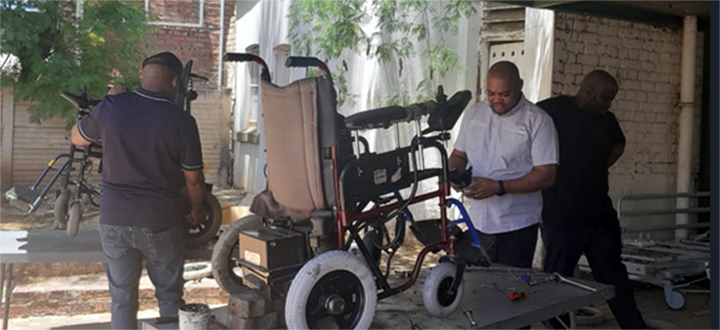 Unisa engineering team restores mobility and dignity
Unisa engineering team restores mobility and dignity
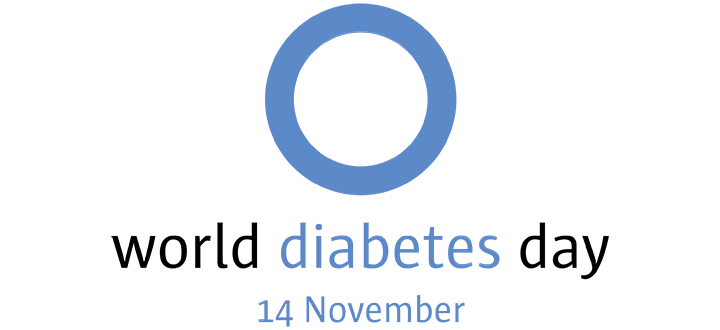 Unisa leads research into South Africa's number one killer
Unisa leads research into South Africa's number one killer
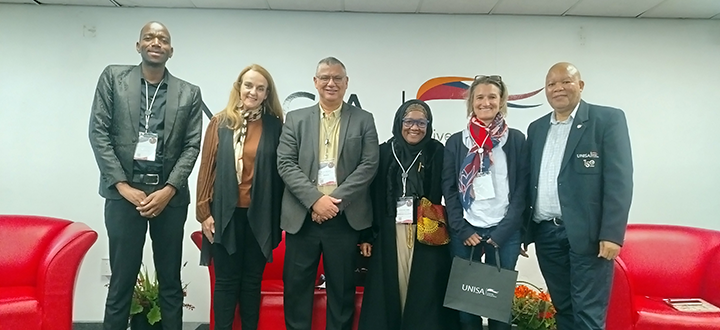 Unisa symposium highlights the need to rethink education for the AI era
Unisa symposium highlights the need to rethink education for the AI era
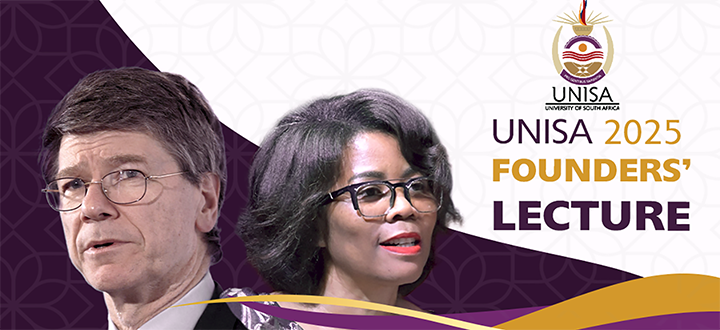 Renowned economist and global leader in sustainable development to speak at Unisa
Renowned economist and global leader in sustainable development to speak at Unisa